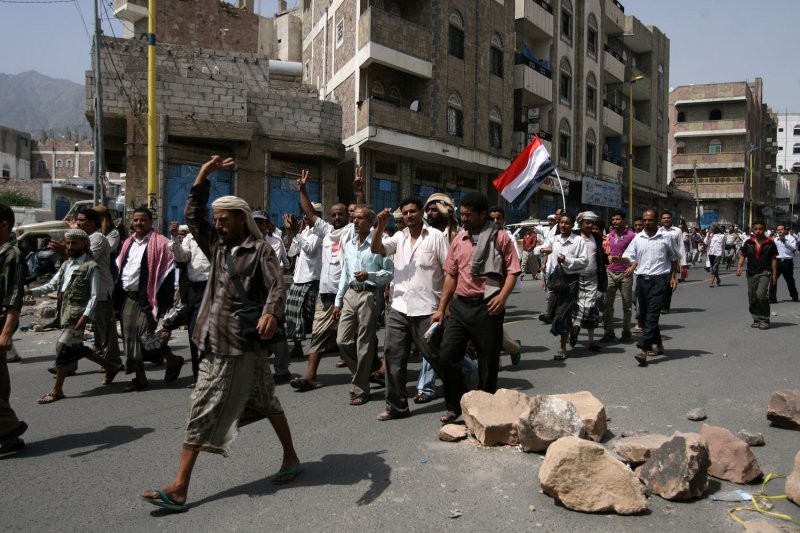1 of 3 | Tribesmen celebrate in Yemen's second-largest city Taez (Taiz), a flashpoint of anti-regime demonstrations south of the capital Sanaa, on June 5, 2011, as hundreds of people took to the streets to celebrate the departure of long term President Ali Abdullah Saleh, wounded in a blast June 3, and who left for treatment in Saudi Arabia. UPI\Mohammad Abdullah |
License Photo
RIYADH, Saudi Arabia, June 7 (UPI) -- Yemen's embattled President Ali Abdullah Saleh is being patched up in Saudi Arabia after being wounded in an attack on his palace by dissident forces seeking to end his 33-year rule.
The big question is will he stay in the kingdom, as the Saudis and the Americans want, to avert an all-out civil war in the Arab world's poorest state that will bolster al-Qaida forces there, Osama bin Laden's ancestral home.
Saleh, who suffered head and chest wounds in a rocket and mortar attack Friday as he prayed in his palace mosque in Sanaa, Yemen's ancient capital, has vowed he will return.
That remains to be seen. No doubt, the Americans and the Saudis will be offering Saleh, who has ruled in Sanaa with an iron fist and a deep pocket since 1978, generous terms to throw in the towel after months of escalating violence.
This is most likely to involve large amounts of money to buy off Saleh and his family and key supporters.
The Saudis have a long history of meddling in Yemen, the kingdom's southern neighbor and buying off tribal factions that cause trouble.
The Saudis backed Yemen's royalists in the country's civil war in the 1960s after republicans, including Saleh, toppled the 1,000-year-old imamate in Sanaa.
Saleh and others, who triumphed because of Egyptian support, have never forgotten that but in recent years have come to rely on Saudi largesse to keep them in power.
The Saudis, jittery because of the political upheaval that has swept the Arab world since January and toppled two veteran tyrants so far, want to stabilize Yemen, with or without Saleh.
They want to be able to concentrate their energies on countering the expansionist strategy of Iran, their main rival in the Persian Gulf region.
Saleh, despite the defection of large numbers of his army and tribal allies in recent weeks, retains significant support among key military units, most of them commanded by family members.
At least five of his senior aides -- including the prime minister, deputy prime minister, the presidential security adviser and the speaker of Parliament -- are also in Riyadh undergoing medical treatment.
But any attempt by Saleh to go back to Sanaa, much of which is held by forces opposed to him, would almost certainly trigger a major conflict that could tear the country apart.
Yemen lies on the southwestern tip of the Arabian Peninsula and commands the strategic Bab-el-Mandeb Strait, a vital waterway and trade route that links the Red Sea and the Indian Ocean.
If al-Qaida in the Arabian Peninsula, the most dangerous jihadist group outside Pakistan, succeeded in using the turmoil to extend its power in Yemen, a tribal state that has long splintered between north and south, it could link up with Islamist forces in Somalia across the Gulf of Aden.
Yemen's economy is sliding inexorably toward total collapse and the country is even running out of water. All this has fueled unrest surrounding the authoritarian rule of Saleh and his family, including his son Ahmed whom he's been grooming to take his place.
The Americans and the Saudis want to avoid at all costs anything that will exacerbate the crisis and threaten stability in Saudi Arabia, the world's leading oil producer.
Friday's attack on Saleh's palace involved a pinpoint strike at the presidential mosque, suggesting that officers within Saleh's retinue are plotting against him.
"It is very likely that at least some elements loyal to Saleh, seeing the deteriorating political and economic situation in the country and in collaboration with his opponents, decided that the only way out of the stalemate was to attempt a coup and physically eliminate Saleh, even at the risk of inciting an intense tribal conflict," the global security think tank Stratfor observed.
The key figure to watch in the days ahead is Brig. Gen. Ali Mohsen al-Ahmar, commander of the elite 1st Armored Brigade and the northwestern military zone who broke with Saleh several weeks ago.
By leading large numbers of troops and tribesmen loyal to his family into the anti-Saleh camp, Mohsen dramatically changed the equation. If Saleh tackles him head-on in a bid to hold onto power, Yemen will explode.





